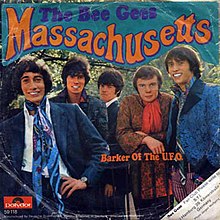
The Bee Gees were a musical group formed in 1958 by brothers Barry, Robin, and Maurice Gibb. The trio were especially successful in popular music in the late 1960s and early 1970s, and later as prominent performers in the disco music era in the mid- to late 1970s.

Best of Bee Gees is a 1969 compilation album by the English-Australian rock band Bee Gees. It was their first international greatest hits album. It featured their singles from 1966–1969 with the exception of the band's 1968 single "Jumbo".

"Night Fever" is a song written and performed by the Bee Gees. It first appeared on the soundtrack to Saturday Night Fever on RSO Records. Producer Robert Stigwood wanted to call the film Saturday Night, but singer Robin Gibb expressed hesitation at the title. Stigwood liked the title Night Fever but was wary of marketing a movie with that name. The song bounded up the Billboard charts while the Bee Gees’ two previous hits from Saturday Night Fever soundtrack were still in the top ten. The record debuted on the Billboard Hot 100 Chart at #76, then leaped up 44 positions to #32. It then moved: 32–17–8–5–2–1. It remained at #1 for eight weeks, and ultimately spent 13 weeks in the top 10. For the first five weeks that "Night Fever" was at #1, "Stayin' Alive" was at #2. Also, for one week in March, Bee Gees related songs held five of the top positions on the Hot 100 chart, and four of the top five positions, with "Night Fever" at the top of the list. The B-side of "Night Fever" was a live version of "Down the Road" taken from the Bee Gees 1977 album, Here at Last... Bee Gees... Live.

Vincent Melouney is an Australian musician. He is best known as an official member of the Bee Gees from 1967 to 1969 during the group's initial period of worldwide success.
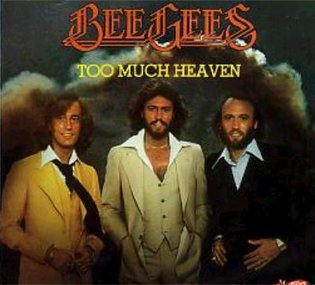
"Too Much Heaven" is a song by the Bee Gees, which was the band's contribution to the "Music for UNICEF" fund. They performed it at the Music for UNICEF Concert on 9 January 1979. The song later found its way to the group's thirteenth original album, Spirits Having Flown. It hit No. 1 in both the US and Canada. In the United States, the song was the first single out of three from the album to interrupt a song's stay at #1. "Too Much Heaven" knocked "Le Freak" off the top spot for two weeks before "Le Freak" returned to #1 again. "Too Much Heaven" also rose to the top three in the UK. In the US, it would become the fourth of six consecutive No. 1s, equalling the record set by Bing Crosby, Elvis Presley, and the Beatles for the most consecutive No. 1 songs. The six Bee Gee songs are "How Deep Is Your Love", "Stayin' Alive", "Night Fever", "Too Much Heaven", "Tragedy" and "Love You Inside Out". The songs spanned the years of 1977, 1978 and 1979.

Horizontal is the fourth studio album by the Bee Gees, and their second album to receive an international release. The LP was released in early 1968, and included the international hit singles "Massachusetts" and "World". On 5 February 2007, Reprise Records reissued Horizontal with both stereo and mono mixes on one disc and a bonus disc of unreleased songs, non-album tracks, and alternate takes. The album was released in Polydor in many countries and on Atco only in the US and Canada. "And the Sun Will Shine" was released as a single only in France. The influences displayed on the album range from the Beatles to baroque pop.
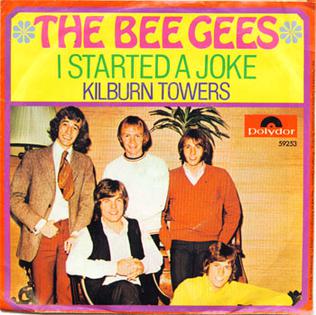
"I Started a Joke" is a song by the Bee Gees from their 1968 album Idea, which was released as a single in December of that year. It was not released as a single in the United Kingdom, where buyers who could not afford the album had to content themselves with a Polydor version by Heath Hampstead. This is the last Bee Gees single to feature Vince Melouney's guitar work, as he left the band in early December after this song was released as a single.
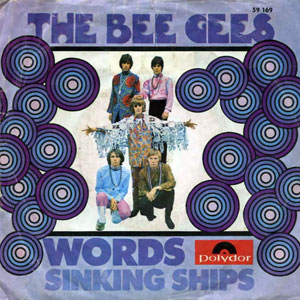
"Words" is a song by the Bee Gees, written by Barry, Robin and Maurice Gibb. The song reached No. 1 in Germany, Canada, Switzerland, and the Netherlands.
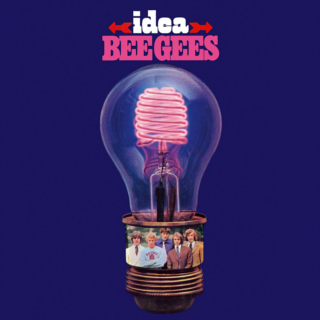
Idea is the fifth album by the Bee Gees. Released in September 1968, the album sold over a million copies worldwide. The album was issued in both mono and stereo pressings in the UK. The artwork on the Polydor release designed by Wolfgang Heilemann featured a "beehive" neon lightbulb with a group photo in its base, while the North American ATCO release designed by Klaus Voormann featured a composite head made from each band member. It was their third internationally released album – the first two albums being released only in the Australian market.
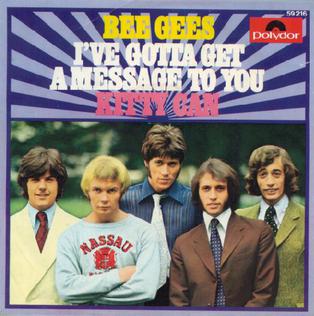
"I've Gotta Get a Message to You" is a song by the Bee Gees. Released as a single in 1968, it was their second number-one hit in the UK Singles Chart, and their first US Top 10 hit. Barry Gibb re-recorded the song with Keith Urban for his 2021 album Greenfields.

"How Can You Mend a Broken Heart" is a song released by the Bee Gees in 1971. It was written by Barry and Robin Gibb and was the first single on the group's 1971 album Trafalgar. It was their first US No. 1 single and also reached No. 1 in Cashbox magazine for two weeks.
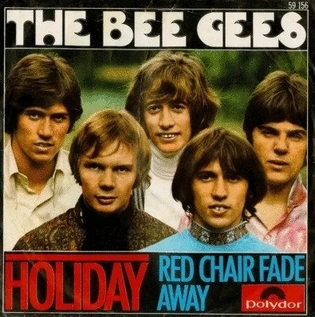
"Holiday" is a song released by the Bee Gees in the United States in September 1967. It appeared on the album Bee Gees' 1st. The song was not released as a single in their native United Kingdom because Polydor UK released the single "World" from their next album Horizontal.
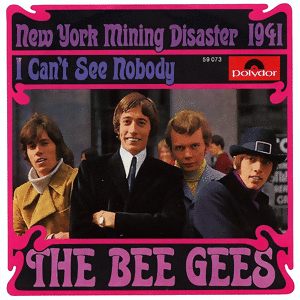
"New York Mining Disaster 1941" is the debut American single by the Bee Gees, released on 14 April 1967. It was written by Barry and Robin Gibb. Aside from a moderately successful reissue of their Australian single "Spicks and Specks," it was the first single release of the group's international career and their first song to hit the charts in both the UK and the US. It was produced by Ossie Byrne with their manager Robert Stigwood as executive producer. The song was the first track of side two on the group's international debut album, Bee Gees' 1st. This was the first single with Australian drummer Colin Petersen as an official member of the band.
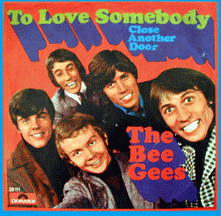
"To Love Somebody" is a song written by Barry and Robin Gibb. Produced by Robert Stigwood, it was the second single released by the Bee Gees from their international debut album, Bee Gees 1st, in 1967. The single reached No. 17 in the United States and No. 41 in the United Kingdom. The song's B-side was "Close Another Door". The single was reissued in 1980 on RSO Records with "How Can You Mend a Broken Heart" as its flipside. The song ranked at number 94 on NME magazine's "100 Best Tracks of the Sixties". It was a minor hit in the UK and France. It reached the top 20 in the US. It reached the top 10 in Canada.

"World" is a song by the Bee Gees, released in 1967 as a single in the United Kingdom and Europe and then included on their album Horizontal the following year. Though it was a big hit in Europe, Atco Records did not issue it as a single in the United States, having just issued a third single from Bee Gees' 1st, "Holiday".
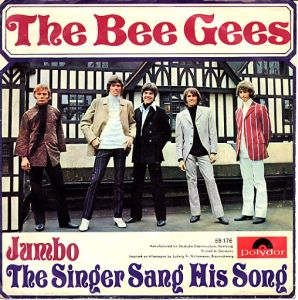
"Jumbo" is a song released by the Bee Gees, written by Barry, Robin and Maurice Gibb. It was released as a double A side with "The Singer Sang His Song" but featured as the lead track in some territories.

"First of May" is a song by the Bee Gees with lead vocals by Barry Gibb, released as a single from their 1969 double album Odessa. Its B-side was "Lamplight". It also featured as the B-side of "Melody Fair" when that song was released as a single in the Far East in 1971 as well as in 1976 and 1980 on RSO Records. It was the first Bee Gees single to be released after lead guitarist Vince Melouney had left the group.

"I.O.I.O." is a song by the Bee Gees, released on the album Cucumber Castle. It was written by Barry and Maurice Gibb. The song was released as a single in March 1970, and was also one of the highlights of the album. The single was a relative success mainly on European charts. Its music video is taken from the film Cucumber Castle.

Bee Gees' 1st is the third studio album by the Bee Gees, and their first international full-length recording after two albums distributed only in Australia and New Zealand. Bee Gees' 1st was the group's debut album for the UK Polydor label, and for the US Atco label. Bee Gees 1st was released on 14 July 1967 in the UK. On 9 August it entered the UK charts; on that same day, the album was released in the US, and it entered the US charts on 26 August.

"Run to Me" is a song by the Bee Gees, the lead single from the group's album To Whom It May Concern (1972). The song reached the UK Top 10 and the US Top 20.
